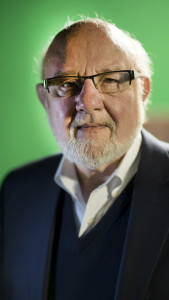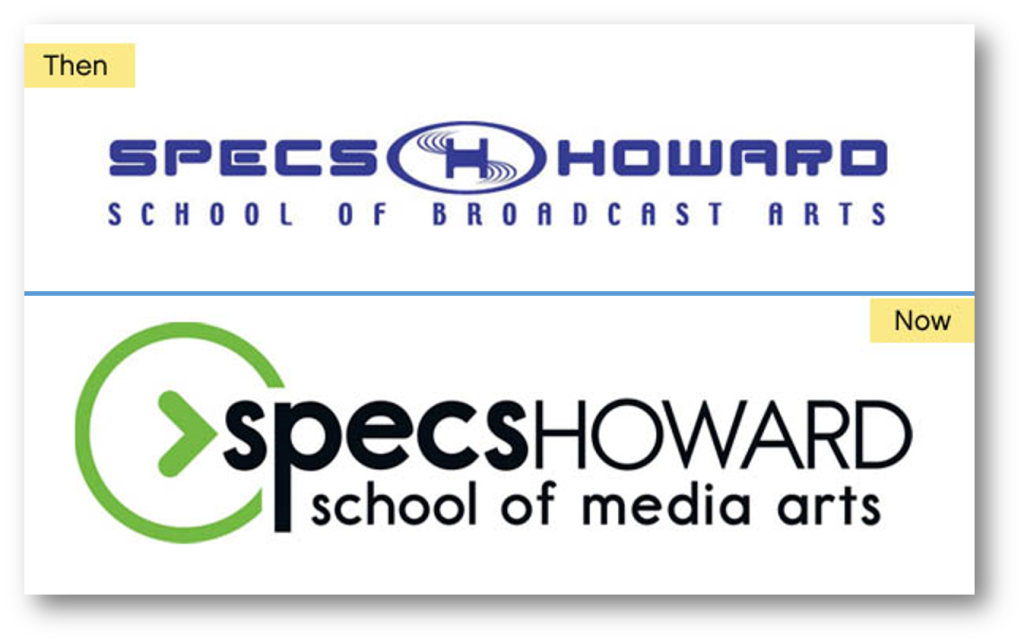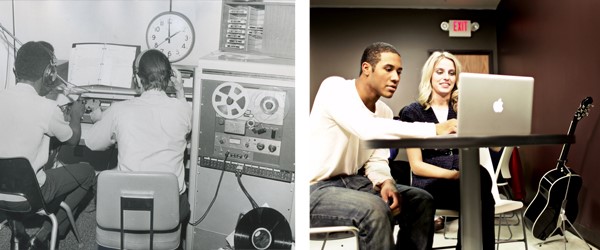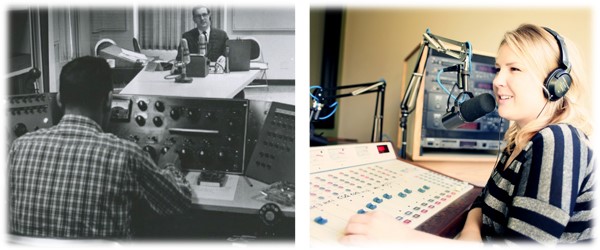 Dick Kernen has been in the radio business for over 50 years. He started with ABC in Detroit in the 1950s and was the first program director at the legendary WRIF when it signed on in the late ’60s. But for 44 years he’s been helping thousands of people start their media careers at the Specs Howard School of Media Arts.
Dick Kernen has been in the radio business for over 50 years. He started with ABC in Detroit in the 1950s and was the first program director at the legendary WRIF when it signed on in the late ’60s. But for 44 years he’s been helping thousands of people start their media careers at the Specs Howard School of Media Arts.
Things have changed a lot at Specs over the years, as have the requirements for a successful career in radio, and other aspects of the media world. At the beginning, the phrase “Broadcast Arts” described the school. Today, it is aptly named “Media Arts,” but the school continues to train many future radio professionals.
Countless Detroit and Michigan radio and TV stars – DJs, talk hosts, salespeople, GMs, engineers, and anchors – came through Specs. But like every other media business, the school has had to evolve, pivot, reboot, and reboot in order to adapt to the rapidly changing media environment.
In some ways, the changes they’ve endured and how they’ve reacted to them provide a survival lesson for all media and broadcast brands. It’s about staying relevant and keeping up with your customers, and Specs has displayed the unique ability to do just that.
If you want to gain a better sense of what’s important in the radio industry, look no further than how this school has shifted its focus to keep up with changing times…and changing generations of students. The photos below depict the ways in which the Specs Howard School has adapted to the media change that is all around us.
Here are Dick’s “5 New Skills That Broadcasting Schools Are Now Teaching.”
In the beginning, we were a DJ school. Students came here to be “on the air.” The emphasis was on developing a decent voice, grammar, board operation and “hitting the vocals.” In the past 40+ years, we’ve added training in TV, video and digital media, but we continue to attract those who want to pursue careers “in radio.” Today however, they must bring new skills to those positions, so what we teach in 2016 is a lot different. Here are 5 things we weren’t teaching in DJ school back in the day:

1. Social Media
Social media has become an integral part of almost every station. To the surprise of most students, it requires training in how to relate to your audience. It takes more than a “hey and howdy” to build loyalty and respect for the station and the personality. That’s now a part of our training.
2. WordPress
Every station has a website, and on-air personalities are often responsible for contributing content on a regular basis. How to manage the website is part of it, but what to add — and not add — however, isn’t second nature and must be taught. So we teach WordPress as part of our course.

3. Blogs and Podcasts
Blogs and podcasts are also huge, but often people don’t understand that, even though they may think of it as “theirs,” the content reflects on the station and has to deliver to those goals.
4. Video
Radio stations are also becoming aware of video (huh?). As technology gets more affordable, video offers another way to attract the audience. There’s a morning show here in Detroit with a studio that contains four, yeah four, cameras controlled by someone whose only responsibility is their operation.
5. Personality

Last but certainly not least, personality. How do you teach that? The only way people develop their personality, is the same way athletes become great. First, it’s critical to have a passion for performing, because if you don’t, you won’t do the second thing, and that’s practice, practice, practice. We have 20 studios, so nobody has an excuse not to practice.
So we’ve come a long way from being a DJ school, and the skills necessary to make it in radio have come a long way, too.
More Guest Lists
- Paul Douglas: 5 Ways Radio Can Make Sense Out Of PPM
- Rich Homberg: The 5 Things Today’s Radio Personalities Can Learn from J.P. McCarthy
- Blubrry’s Todd Cochrane: 5 Things You Should Know About Podcast Measurement
- Elsie Escobar: 5 Things Radio Broadcasters Should Know About Podcasting
- David Oxenford: 5 Things Broadcasters Should Know About Music Royalties
- How AI Can Give Radio Personalities More…PERSONALITY - April 23, 2025
- Can Radio Afford To Miss The Short Videos Boat? - April 22, 2025
- Media And Technology In 2025: Believe It Or Not! - April 18, 2025





Broadcasting: A valuable life skill with adaptive radiation.
That it is. Thanks, Clark.
Thank You for the Great Tips!
Thank you for reading our blog.
As a veteran broadcaster, it is my hope that your broadcast training courses will include the following:
1. The word is “YOUr”… not “yore”.
(A professional broadcaster is being paid to speak correctly, and neither sound like a hillbilly or making a reference to the middle ages.)
2. The importance of an announcer listening to an ‘air check’ at least once per week must be stressed. ‘Practice, practice, practice is a good thing… ONLY IF each practice reflects implemented improvements, and the only way to know where those improvements need to be made are by a broadcaster listening to his or her own air check.
3. The gall of meteorologists must not be tolerated. Do not allow this glorified weatherman the audacity of broadcasting phrases like, “It’s a gloomy day.” It’s a lie. It’s somebody’s birthday, or someone’s wedding day, or someone’s day to receive an award. The day may have ‘dark clouds’, which is a fact, but let not this pompous forecaster take away the public’s agency to decide what kind of day it is.
4. And, while on the subject of meteorologists… also don’t tolerate ‘shop talk’ during a broadcast. The word ‘precipitation’ is a perfectly valid word which encompasses many things such as rain, sleet, and snow, but… “pre-cip” must not be tolerated. That’s the kind of thing a meteorologists would say privately to each other in the office, but… NEVER to the public. (‘Pre-sip’ is the time you blow on your hot coffee… before you… sip.)
5. Show enough professionalism and respect for engineers and other technical employees at the station to refer to them on the air by their actual duty title. If they’re performing the work, they deserve that respect. An example of not doing this is the morning drive-time announcer at a Kansas City talk station who, while listing all those at the station contributing to that broadcast names a man and tells the audience that he’s “flying the plane”. The audience is clueless to the fact that what the announcer means is that the man named is at the controls of the audio board. Of further consequence is the fact that a Vietnam veteran helicopter pilot is providing the morning traffic report and really is… ‘flying the plane’, and risked his life to learn how to do so effectively in both peace and war. So, for the announcer to say the audio board operator is ‘flying the plane’ is a slap in the face and an insult to the military veteran helicopter pilot doing the traffic reports.
6. “Oh” is not a number! If you’re voicing an commercial and at the end of that commercial you add the all important ‘action step’ of telling the listener to call a phone number, that phone number does NOT contain an… ‘Oh’. It may, however, contain a ZERO.
7. “The right-hand’ lane. Announcers may bring with them to the profession certain ‘bad habits’ which must be eliminated. Again, regularly listening to a personal air check will help the new announcer rid themselves of these bad habits. One example of a bad broadcaster habit is that of ‘handedness’. When listening to a traffic report, you may hear a broadcaster identify a particular north bound highway and say… “…there’s a car stalled in the ‘right-hand lane’. ” Really? As opposed to… the ‘LEFT-FOOT’ lane. As a new broadcaster, be a professional and… listen… to what you’re saying on that air check. It’s either the ‘Right lane’ or it’s the ‘Left lane’.
8. No Returning Storms. Here’s another bit of broadcast foolishness. You may hear an announcer or meteorologist say, “Remember the rain we had two days ago? Well, it will be back tomorrow.” This is the kind of absurdity a novice broadcaster will speak to the public to show his ignorance. Generally, when a weather event such as a rain shower, snow storm, or whatever, moves into an area, it continues in one direction and, in time, moves out of the area… and continues in the same direction into the next state. It does NOT… make a ‘U-Turn’ and ‘come back’. The only exception to this rule, of course, could be a tornado… which could, in fact, circle around and further damage an area it had already crossed. The upshot, or course, is that one would say, “More rain will be moving into our area on Tuesday.”
9. IF YOU ARE IN THE NEWS DEPARTMENT YOU ARE NOT A DISC JOCKEY ! This is an subject which MUST be made perfectly clear. A disc jockey may be the ‘light hearted’, flamboyant type, or even a WKRP ‘Johnny Fever’, and that’s fine if it fits with the foremat. He’s allowed to say all sorts of hip, cute, and teasing things on the air. With that said, I repeat: “If you are in the NEWS department, you are NOT a disc jockey.” The News Department has both ‘Rules’ and ‘Standards’. A professional newscaster can be plucked from a Top 40 station and dropped into a Country station and ‘it won’t make a dime’s worth of difference’. Why? Because he’s a professional, and his newscast is going to sound the same, and will possess ‘the three Cs’: Clear, Concise, and Correct. Here’s an example of what I’m talking about. A Disc Jockey may say, “This weekend make it on out the the classic car show on the main drag in ‘Saint Joe’, Missouri.” It’s impossible for a professional Newscaster to speak that sentence. Why? Because ‘Saint Joe’ doesn’t exist on a Missouri map. It’s not ‘correct’ or ‘factual’. However, ‘Saint Joseph’, Missouri IS on the map, and that’s the reference the professional newscaster would use.
10. Professional Courtesy. I sometimes listen to an afternoon drive-time radio talk show in my metro radio market. A male and a female banter on a variety of subjects, from the silly to the obscene. But, sometimes, the female news caster is invited to join the banter, which is fine on a limited basis. HOWEVER, a line MUST be drawn the moment that newscaster opens the mic to begin the regularly scheduled newscast. At the station I listen to, the male ‘talk personality’ will sometimes open his mic and make a comment during a live newscast. This is UNPROFESSIONAL, and must absolutely not be tolerated. It is an insult to the newscaster and all the preparations which have been made, personally, to present a professional newscast. Program directors who tolerate such conduct aren’t worth their salt.
All of these suggestions were pertinent when we listened to radio by candlelight because there was no electricity.
I disagree. If a station can dominate the market despite committing the fallacies that Mr. Autry points out, fine, let them continue with what is working. But if a station is failing while committing these things that Mr. Autry finds unprofessional, they may want to take his suggestions to heart.
Kurt, it’s all about the situation, and a brand’s mission. Thanks for the comment.
And it begins. Thanks, Johnny.
Ed, I have an appreciation for some of these rules, but I think the sensibilities have changed. When TMZ breaks the Prince story while AP, the New York Times, and Washington Post staffs are reading through guidelines, wringing their hands, it suggests that some of the barriers, rules, and restrictions have been modified by a new generations of consumers. And so it is the same with terminology and phraseology. Thanks for these. Curious to see how others view them.
I was quite surprised to see “Personality” as among the talents now being taught at radio schools. When I started in radio back in the 70’s most of us were perceptive enough to cull traits from those in the industry we looked up to and molded our own style around that. Today, especially prevalent in mega-corporate owned stations, I’ve seen liner cards and notes taped to the console regarding brevity on the air – not wanting to alienate listeners. Having grown up listening to the personality radio of the 1960’s and 1970’s coming from New York City it seems today’s radio is a shadow of what was once heard. It makes me wonder just how disillusioned these students will get before they decide on yet another line of work.
Bill, I think in this environment, stressing the importance of personality is not a bad thing – even if fledgling broadcasters end up working for station that is all about card-reading. Understanding the importance of the listener and the advertiser, community service, and building a personality brand are good life skills. Thanks for the comment.
As an old school broadcaster I have a couple of suggestions.
1. Location, location, location! How many retail establishment have thei address pominately displayed? Probably less than one percent. Better to say “on main just east of…….or next to (well known site). Soaring eagle casino, Michigan Adventure Park and Cedar point are notorious for not telling the listeners where they are. Is Michigan Adventure Park near Muskegon ? Ludington Alpena. What roads is it close to. Anyway you get my point. 2. Enunciate, enunciate, enunciate. You are a professional….talk like it.
Greg, some of this also comes down to agencies getting that message, too, and insisting it’s part of the copy strategy. But there’s no question that location is an oft-missed element. As for enunciation, it goes without saying, but thanks for saying it.